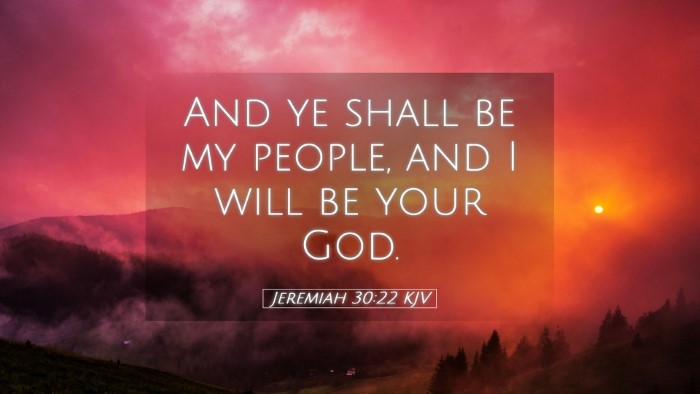Bible Commentary on Jeremiah 30:22
Verse: Jeremiah 30:22
"And ye shall be my people, and I will be your God."
General Overview
Jeremiah 30:22 is a pivotal verse in the Book of Jeremiah, encapsulating God's promise of restoration and covenant relationship with His people. The context of this chapter is the prophetic assurance given to Israel amidst their suffering and exile. In this commentary, we will explore the theological implications, historical context, and spiritual significance of the verse as elucidated by various public domain commentaries.
Theological Implications
This verse embodies the core theme of the covenant relationship between God and His people. The declaration “and ye shall be my people” emphasizes both a communal identity and personal relationship. It signifies God’s unwavering commitment to Israel, despite their numerous transgressions.
Matthew Henry notes that this promise is "a promise of love and favor," highlighting the unconditional nature of God's grace. He elaborates that even amidst judgment, God’s intent is to restore His people and reaffirm their identity as His chosen ones.
Albert Barnes emphasizes that this verse can be viewed as an assurance of the new covenant established through Christ. He posits that the promise extends beyond the immediate historical context to encompass all who believe, as they too become His people in a spiritual sense.
Adam Clarke draws attention to the significance of the phrase “and I will be your God.” This not only signifies protection and provision but also reflects the relational aspect of God's character, inviting His people into deeper communion with Him.
Historical Context
Jeremiah prophesied during a tumultuous time for Israel, characterized by political instability, social injustice, and spiritual decline. As the nation faced impending exile, the context of this verse serves to bring hope and assurance to a weary people.
Matthew Henry notes that the prophecy serves a dual purpose: it addresses the immediate fears of exiled Israelites while projecting their eventual restoration. The phrase “ye shall be my people” signifies a renewal of identity that was shaken during exile.
Albert Barnes provides insight into the socio-political environment, mentioning the influence of surrounding nations and the consequences of Israel's infidelity to God. This promise of restoration is a reminder that God's mercy prevails over their failures.
Spiritual Significance
For pastors, students, and theologians, Jeremiah 30:22 serves as a powerful reminder of the faithfulness of God in times of hardship. It encourages believers to hold fast to the assurance that they belong to God, even in the face of adversity.
Adam Clarke asserts that this promise creates a sense of belonging and community. The phrase “ye shall be my people” not only affirms individual identity but also communal connection among believers, fostering unity in the Body of Christ.
Matthew Henry stresses the importance of embracing our identity as God’s chosen people. He encourages reflection on how this identity should shape our conduct and relationships, urging believers to live in a manner that reflects their covenant relationship with God.
Practical Applications
-
Identity in Christ: Believers should embrace their identity as God’s people, recognizing that this comes with responsibility and privilege.
-
Hope in Despair: In times of trouble, this verse serves as a source of comfort, reminding the faithful of God's unfailing promise and presence.
-
Covenantal Living: The idea of being God’s people calls for a lifestyle that reflects His holiness and love, impacting how believers interact both with God and with others.
Conclusion
Jeremiah 30:22 encapsulates a profound promise that resonates deeply with the themes of hope, identity, and covenant. Through the insights of Matthew Henry, Albert Barnes, and Adam Clarke, we glean a rich understanding of the verse's significance both historically and spiritually. As we reflect upon this promise, may we be encouraged to live as God's people, fully embracing the blessings and responsibilities that come with such a relationship.


